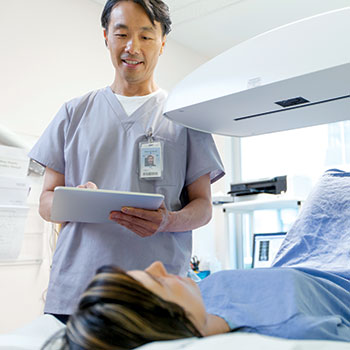Osteoporosis is a disease in which bones become fragile and brittle and are prone to fracture. Osteoporosis affects 44 million Americans, mostly women, but also men. Osteoporosis increases the risk of fractures which can be disabling or even deadly. Osteoporosis is treatable and may be preventable. People need to know their risk for osteoporosis and talk to their doctors about diagnosis, prevention and treatment.
There are two ways to find out if you have osteoporosis: by breaking a bone or by getting a bone density test. Just as it is important to know your blood pressure and cholesterol, it is also important to know your T-score. Osteoporosis is diagnosed with bone density testing. At Radiology and Imaging Specialists (RIS), we offer state-of-the-art bone density testing with a Hologic DEXA scanner. The lumbar spine, hips and wrists can be tested. A “T-score” is obtained for each body part tested. By World Health Organization (WHO) criteria, a T-score greater than minus (-) 1.0 is normal, minus (-) 1.0 to (-) 2.5 is osteopenia and less than minus (-) 2.5 is osteoporosis.
To learn more about our osteoporosis screening services and DEXA Bone Density scans, please call (863) 688-2334.
Osteoporosis Risk Factors:
- Age — increased age, increased risk.
- Gender — females greater than male.
- Family history.
- Race — Caucasian, Asian, greater than Hispanic, African-American.
- Bodyweight — low body weight, increased risk.
- Menopause.
- Lifestyle — cigarettes, excess alcohol, increased risk.
- Medications — steroids, certain anti-seizure medications, etc.
Who Should Undergo DEXA Bone Density Testing:
- All postmenopausal females, females with history of premature menopause.
- Patients with an unexplained fracture.
- Patients on medications which increase risk of osteoporosis such as steroids.
- Patients considering hormone replacement therapy or other treatment for osteoporosis.
- History of osteoporosis, follow up of treatment for osteoporosis.
- Osteoporosis on radiographs.
Prevention of Osteoporosis:
- Eat a balanced diet rich in calcium and Vitamin D.
- Take daily multivitamins and calcium supplements.
- Do weight-bearing exercise.
- Reduce smoking and alcohol intake.
- Hormone replacement therapy and medications may also be indicated. Discuss medical treatment options with your referring physician.
- Avoid unsafe conditions which can lead to falls and fractures.
- Discuss your medications and their effect on your bone density with your referring physician.
- Bone density testing is recommended to know where you stand as far as bone health.
Preparation for Exam:
- There is no special preparation. You may eat normally.
- There is no need to disrobe if you wear clothes without buttons, zippers or other metals. Loose-fitting clothes such as workout outfits, sweatpants, and sweatshirts are recommended.
- You should not have this exam if you have had any kind of barium study within the last week.
- You will be asked to fill out a questionnaire prior to your scan to help your radiologist in interpreting your bone density test.
What to Expect
The DEXA Bone Density test will take approximately 15-20 minutes. You will be lying on your back throughout your exam. The actual scanning of the spine, hips and wrists only takes a few minutes. The exam is painless with no injections. Your exam will be reviewed by our radiologist who specializes in bone density interpretations and results will be sent to your referring physician.
Schedule Your DEXA Bone Density Scan Today
To learn more about our osteoporosis screening services, please call (863) 688-2334. Radiology and Imaging Specialists proudly serves Lakeland, Kissimmee, Plant City, and the surrounding areas in Central Florida and Polk County.

